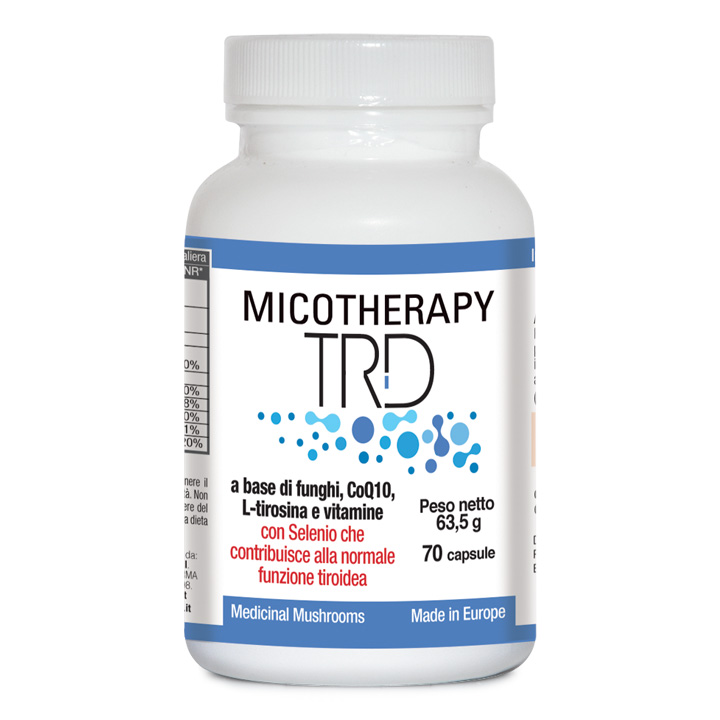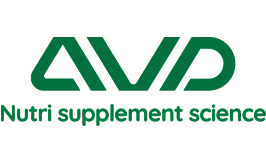
Nourishment and support of the thyroid
Food supplement containing medicinal mushrooms from organic farming and B-complex vitamins, with CoQ10, L-Tyrosine, Selenium and Iodine from Fucus vesiculosus.
Health benefits:
Micotherapy TRD is a formulation designed to improve thyroid function: Reishi and ABM help regulate the stress axis and improve moods, Tyrosine, Selenium, Iodine and B vitamins stimulate the production of thyroid hormones, contributing to protect the thyroid from oxidative stress and boost the proper functioning of the nervous system.
Ingredients:
- ABM (Agaricus blazei Murril sporophorum) dry extract titrated at 25% in polysaccharides
- Reishi (Ganoderma lucidum P. Karst sporophorum) dry extract titrated at 25% in polysaccharides
- L-Tyrosine
- Fucus (Fucus vesiculosus L.) dry extract titrated at 0.1% in iodine
- Zinc gluconate
- Coenzyme Q10
- Selenium methionine
- Vit. B6 (pyridoxine)
- Folic acid
- Vit. B12 (cyanocobalamin)
Properties of the ingredients:
- ABM (Agaricus Blazei Murril) dry extract: controls inflammation and oxidative stress. It improves immune-based thyroid problems.
- Reishi (Ganoderma lucidum P. Karst) dry extract: it modulates the immune system and helps rebalance cortisol levels. It helps regulate the stress axis and improve moods.
- L-Tyrosine: essential amino acid for the production of neurotransmitters and thyroid hormones. Recommended in case of hypothyroidism.
- Fucus dry extract: useful as a thyroid support and as an aid in weight loss diets, the iodine contained in Fucus is easily assimilated by the body and it concentrates in the thyroid. Iodine is an essential micronutrient for the synthesis of thyroid hormones.
- Zinc glutonate: zinc participates as a co-factor in the synthesis of thyroid hormones and in the conversion of T4 into T3.
- Coenzyme Q10: antioxidant, restores mitochondrial function. The combined effect of CoQ10 and Selenium improves thyroid and cardiovascular function.
- Selenium methionine: a source of selenium, particularly recommended for the treatment of autoimmune thyroid diseases. Its deficiency can lead to changes in thyroid function.
- Vit. B6 (pyridoxine): useful in the treatment of hyperthyroidism, it enables iodine to make thyroid hormones. Reduces the levels of psycho-physical stress.
- Vit B9 (Folic acid): regulates the metabolism. Low levels of folic acid in the blood are related to an increase in homocysteine, which is responsible for atherosclerosis, risk of heart attack, embolism and stroke.
- Vit. B12 (cyanocobalamin): vitamin B12 supplementation improves symptoms in patients with hypothyroidism.
Directions:
1 capsule 3 times per day, preferably away from meals.
Pack:
pack containing 70 capsules
vegetable cellulose capsules
Notes:
Gluten free
Made in Europe
| Ingredients | Per 3 capsules | %VNR* |
| Agaricus blazei dry extracto | 750 mg | |
|
Polysaccharide content |
187,5 mg | |
| Reishi dry extract | 750 mg | |
|
Polysaccharide content |
187,5 mg | |
| L-tyrosine | 300 mg | |
| Fucus dry extract | 225 mg | |
| Iodine content | 225 mcg | 150% |
| CoQ10 | 150 mg | |
| Zinc | 15 mg | 150% |
| Vitamina B6 (pyridoxine) | 9,5 mg | 678% |
| Folic acid (Vit B9) | 400 mcg | 200% |
| Selenium | 83 mcg | 151% |
| Vitamin B12 (cianocobalamina) | 33 mcg | 1320% |
BIBLIOGRAPHY:
- Zimmermann MB (2011) e role of iodine in human growth and development. Semin Cell Dev Biol 22: 645-65
- DeLong GR, Leslie PW, Wang SH, Jiang XM, Zhang ML, et al. (1997) Effect on infant mortality of iodination of irrigation water in a severely iodine-deficient area of China. E Lancet 350: 771-773. 32
- Mitro SD, Rozek LS, Vatanasapt P, Suwanrungruang K, Chitapanarux I, etal. (2016) Iodine deficiency and thyroid cancer trends in three regions of Thailand, 1990-2009. Cancer Epidemiol 43: 92-99
- Andersson M, Karumbunathan V, Zimmermann MB (2012) Global iodine status in 2011 and trends over the past decade. J Nutr 142: 744-750
- Caldwell KL, Miller GA, Wang RY, Jain RB, Jones RL (2008) Iodine status of the US population, National Health and Nutrition Examination Survey 2003-2004. Thyroid, 18:1207-1214
- Pearce, Elizabeth N., and Lewis E. Braverman. “Environmental Iodine Uptake Inhibitors.” Iodine Deficiency Disorders and Their Elimination. Springer International Publishing, 2017. 141-153
- Ferrari, Silvia Martina, et al. “Environmental issues in thyroid diseases.” Frontiers in endocrinology 8 (2017)
- Boussingault JB (1831) Research on the cause which produces goiter in the Cordilleras of New Granada. Ann Chim Phys 48: 41
- Wol J, Chaiko IL (1948) Plasma inorganic iodide as a homeostatic regulator of thyroid function. J Biol Chem 174: 555-564
- Patey-Pirra S, Keriel-Gascou M, Borson-Chazot F (2014) Benefits and risks of iodine supplementation during pregnancy: a review of observational and experimental studies in mild-to-moderate iodine deficiency area. Rev Epidemiol Sante Publique 62: 65-74
- Nazeri P, Mirmiran P, Shiva N, Mehrabi Y, Mojarrad M, et al. (2015) Iodine nutrition status in lactating mothers residing in countries with mandatory and voluntary iodine fortification programs: An updated systematic review. Thyroid 25: 611-620
- Taylor PN, Okosieme, OE Dayan, CM, Lazarus, JH (2014) Therapy of endocrine disease: impact of iodine supplementation in mild-to- moderate iodine deficiency: systematic review and meta-analysis. Eur J Endocrinol 170:1-15. Jacob M, Brito N (2015) Iodine supplementation in pregnancy: how important is it? Portuguese Journal of Public Health 33: 107-119
- Zhou SJ, Skea SA, Ryan P, Doyle LW, Anderson PJ, et al. (2015) e effect of iodine supplementation in pregnancy on early childhood neurodevelopment and clinical outcomes: results of an aborted randomized placebo-controlled trial. Trials 16: 1-1
- Guess K, Malek L, Anderson, A, Makrides, M, Zhou SJ (2016) Knowledge and practices regarding iodine supplementation: A national survey of healthcare providers. Women Birth 30: e56-e60._
- Zava TT, Zava DT (2011). Assessment of Japanese iodine intake based on seaweed consumption in Japan: a literature-based analysis. yroid research 4: 1-1
- Vanderpump, Mark P. “Epidemiology of iodine deficiency.” Minerva medica108.2 (2017): 116-123
- Zhang LR, Sawka AM, Adams L, Hat eld N, Hung RJ (2013) Vitamin and mineral supplements and thyroid cancer: a systematic review. Eur J Cancer Prev 22: 158-168
- Stadel, BruceV. “Dietary iodine and risk of breast, endometrial, and ovarian cancer.” The Lancet 307.7965 (1976): 890-891
- Kim, Hye Jeong, et al. “Strong association of relatively low and extremely excessive iodine intakes with thyroid cancer in an iodine-replete area.” European journal of nutrition 56.3 (2017): 965-971
- Rappaport, Jay. “Changes in Dietary Iodine Explains Increasing Incidence of Breast Cancer with Distant Involvement in Young Women.” Journal of Cancer8.2 (2017): 174
- Tran, H. V., et al. “Is low iodine a risk factor for cardiovascular disease in Americans without thyroid dysfunction? Findings from NHANES.” Nutrition, Metabolism and Cardiovascular Diseases (2017)
- Qin, Feng, et al. “Dietary Iodine Affected the GSH-Px to Regulate the Thyroid Hormones in Thyroid Gland of Rex Rabbits.” Biological Trace Element Research (2017): 1-7
- Peres, Heverton Alves. “Iodine, Ingesting or not.” J Nutr Disorders Ther 7.206 (2017): 2161-0509. L-Tirosina:
- Malamos, B., et al. “The serum tyrosine level as an index of thyroid function.” Journal of Endocrinology 35.3 (1966): 223-228. CoQ10 ossidato e ridotto:
- G. Lenaz, M.L. Genova, Structure and organization of mitochondrial respiratory complexes: a new understanding of an old subject, Antioxid. Redox Signal. 12 (2010) 961–1008
- Moncayo, Roy, and Helga Moncayo. “Applying a systems approach to thyroid physiology: Looking at the whole with a mitochondrial perspective instead of judging single TSH values or why we should know more about mitochondria to understand metabolism.” BBA clinical (2017)
- A. Ben-Meir, et al., Coenzyme Q10 restores oocyte mitochondrial function and fertility during reproductive aging, Aging Cell 14 (2015) 887–895
- H. Kamada, et al., Effects of selenium supplementation on plasma progesterone concentrations in pregnant heifers, Anim. Sci. J. 85 (2014) 241–246
- S.G. Leoni, et al., Regulation of thyroid oxidative state by thioredoxin reductase has a crucial role in thyroid responses to iodide excess, Mol. Endocrinol. 25 (2011) 1924–1935
- A. Singh, et al., Biochemical indices of selected trace minerals in men: effect of stress, Am. J. Clin. Nutr. 53 (1991) 126–131
- 31. P. Rani, K. Lal



